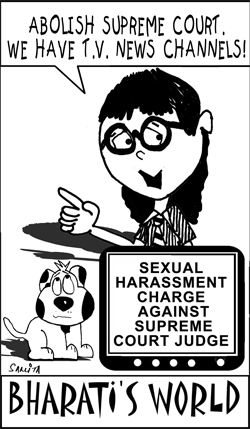The great expectations of educationists, academics and parents in West Bengal, aroused by the Mamata Banerjee-led Trinamool Congress which ended 34 years of rule of the CPM-led Left Front government in 2011, have since been dashed by the ad hoc changes decreed by several committees and commissions. Domi-nated by the state’s mercurial chief minister who claims that education reform is her top priority, these often contradictory recommendations have provoked fears of anarchy in education.
Starting with a 19-member school syllabus reforms committee chaired by Aveek Mazumdar of Jadavpur Univ-ersity in 2011, Banerjee has constituted a number of committees and comm-issions to reform and upgrade education, the latest being an education commission for preparing a road map to improve the state’s education sector over the next two decades. The 12-member commission comprising eminent teachers and scientists, held its first meeting on October 1.
 This commission has been constituted to realise Banerjee’s ‘Vision 2020 and 2030’ education road map that will “take the state towards educational glory”. Headed by Samir K. Brahm-achari, director general of the Council of Scientific and Industrial Research, the panel includes riverine expert Kalyan Rudra, Amitava Bose, former director of the Indian Institute of Management-Calcutta, and Shantanu Maharaj of the Ramakrishna Mission, Belur Math. The commission’s all-encompassing terms of reference are to recommend solutions to improve elementary, secondary, higher secondary, higher, mass, tech-nical, vocational, non-formal and mad-rassa education in the state. The commi-ssion has been directed to submit an interim report within six months of its first session and final report within a year.
This commission has been constituted to realise Banerjee’s ‘Vision 2020 and 2030’ education road map that will “take the state towards educational glory”. Headed by Samir K. Brahm-achari, director general of the Council of Scientific and Industrial Research, the panel includes riverine expert Kalyan Rudra, Amitava Bose, former director of the Indian Institute of Management-Calcutta, and Shantanu Maharaj of the Ramakrishna Mission, Belur Math. The commission’s all-encompassing terms of reference are to recommend solutions to improve elementary, secondary, higher secondary, higher, mass, tech-nical, vocational, non-formal and mad-rassa education in the state. The commi-ssion has been directed to submit an interim report within six months of its first session and final report within a year.
Neither the broad terms of reference nor composition of the Vision 2020/30 commission have impressed the dons of academia in West Bengal. For one, they entertain doubts about the longevity and sustainability of the commission. Memories of resignations of top members of various committees formed by the Trinamool government are still green. They include well- known educationist Sunando Sanyal who resigned as head of the School Syllabus Committee in November 2011; Prof. Muktinath Chatterjee who quit the position of president of State Higher Secondary Education Council in August (2013), and of his successor — eminent economist Sugata Marjit who put in his papers within a month of taking over.
Informed academics in Kolkata are sceptical about the effectiveness of councils and commissions which have not made any substantial contribution to halt the downward plunge — let alone improve — standards of education in West Bengal (pop. 90 million) which right until the mid-1970s — until the Communist Party of India (CPM)-led Left Front government began its 34 years rule of the state — was arguably the country’s most educated state, renowned for its excellent secondary and higher education institutions. They believe the Trinamool government needs to quantify its goals and set aside resources required to attain them.
“Although it’s important to articulate a vision for the future, the goals of the government are not clear. This is why high-profile chairpersons of councils and commissions become easily frustrated and quit. Stability in commissions and councils — as also in universities — is the prerequisite of education reform,” says Dr. Sukanta Bhattacharya, associate professor of economics at Calcutta University.
Reform demanded and/or implemented in a hurry will prove worse than the status quo. West Bengal’s best academics are aware of this truism. Quite obvi-ously chief minister Banerjee isn’t.
Baishali Mukherjee (Kolkata)